 |
 Home | News | Events | Membership | NVArchive | History | Memorial | Contact |
Two ex scholars of Taunton's School have been awarded the Victoria Cross. On this page we honour their moral and physical courage. One of them, Jack Mantle, made the ultimate sacrifice. We will remember them. | |
DANIEL MARCUS BEAK (1891-1967)Daniel Beak was born on the 27th January 1891 at Southampton, the son of Mr. and Mrs. W.H. Beak, formerly of West End House, Donhead St. Mary, Wiltshire. He was educated at Taunton's School, Southampton between 1906 and 1910. He initially joined the Royal Naval Volunteer Reserve as a rating on 2 February 1915, and rose swiftly to Petty Officer. Beak was gazetted Sub-Lieutenant on 8th May 1915 in the Royal Naval Volunteer Reserve for duty with the Royal Naval Division, where he saw service with the Mediterranean Expeditionary Force. He arrived in France in May 1916 and after being appointed adjutant of the Drake Battalion on 2 March 1917, he ended up commanding his battalion as an acting commander between 19 March 1917 and 3 April 1917. Beak was promoted to temporary lieutenant commander on relinquishing command and attached to headquarters. 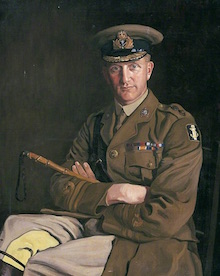 Daniel Beak VC DSO MC & Bar Beak was awarded the Military Cross (MC) in January 1917 after he "led his men in an attack with great courage and initiative and materially assisted in the capture of an enemy line, setting a fine example throughout". On 18 July 1917 he received a bar to his Military Cross for conspicuous gallantry during operations when "he continually dashed forward under heavy fire to reorganise the men and led them on with great bravery through the enemy barrage and machine-gun fire". He attended the Senior Officers' Course in Aldershot in late 1917 and on 31 December was promoted temporary commander, and appointed as commanding officer of the Howe Battalion. Beak initially remained in command of the Howe Battalion, then briefly commanded the Anson Battalion in the first week of March 1918, and then transferred back to the Drake Battalion on 13 March 1918. He was Mentioned in Despatches on 20 May, and awarded the Distinguished Service Order (DSO) on 26 July 1918, "for actions during a night attack by the enemy. The right flank of his division was left in a dangerous position, after the attack. He arranged for a flank to be formed in that direction, and subsequently covered the retirement of two brigades with a composite rear-guard which he organised and commanded. His initiative and presence of mind greatly assisted in extricating these brigades from a very difficult situation. Throughout, the skilful handling of his battalion was particularly noticeable". He was sick for four days with the flu in July 1918, and was granted a period of home leave in August, returning on 10 August. During the period 21/25 August and on 4 September 1918 at Logeast Wood, France, Commander Beak led his men and captured four enemy positions under heavy fire enabling other battalions to reach their objectives. Four days later, although dazed by a shell fragment, in the absence of the brigade commander, he reorganised the whole brigade under extremely heavy gun fire and led his men to their objective. When an attack was held up, accompanied by only one runner he succeeded in breaking up a nest of machine-guns, personally bringing in nine or ten prisoners. His fearless example instilled courage and confidence in his men, who then quickly resumed the advance under his leadership. 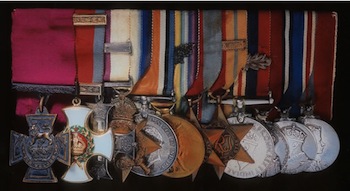 On a subsequent occasion he displayed great courage and powers of leadership in attack, and his initiative, coupled with the confidence with which he inspired all ranks, not only enabled his own and a neighbouring unit to advance, but contributed very materially to the success of the Naval Division in these operations. He received a second Mention in Despatches on 20 December 1918. With the war now over he was granted several periods of home leave, returned home permanently in May 1919, and was demobilised in June. In 1921, he was granted a regular army commission with the Royal Scots Fusiliers as a captain. Beak was in Ireland with his regiment during the Irish War of Independence. In the situation, following the collapse of the British civilian administration, his duties included membership of the Courts of Enquiry in lieu of Inquests. He was given a brevet promotion to major in 1929, and substantive promotion in 1932, on transfer to the King's Regiment. He was promoted brevet lieutenant-colonel in 1935. The substantive promotion followed in 1938, transferring again, this time to the South Lancashire Regiment. During World War II Beak was commander of 12th Brigade, GOC Malta and 151st Infantry Brigade, which he led during Operation Pugilist. Montgomery dismissed him from this post after that battle and he never held another command. He was an acting brigadier by 2 August 1940 when he was promoted to colonel. Colonel Beak was Mentioned in Despatches on 20 December 1940, for services between March and June of that year. He was promoted temporary major-general in January 1942. He retired from the army on 19 February 1945, retaining the honorary rank of major-general. Daniel Beak died on the 3rd May 1967 in the Princess Margaret Hospital, Swindon, Wiltshire, following a long illness. | |
Citation in the London Gazette, 15 November 1918Logeast Wood, France, 21st, 25th August & 4th September 1918, Temporary Commander Daniel Marcus William Beak DSO, MC, Commander Drake Battalion, Royal Naval Volunteer Reserve."For most conspicuous bravery, courageous leadership and devotion to duty during a prolonged period of operations. He led his men in attack, and, despite heavy machine-gun fire, four enemy positions were captured. His skilful and fearless leadership resulted in the complete success of this operation and enabled other battalions to reach their objectives. Four days later, though dazed by a shell fragment in the absence of the brigade commander, he reorganised the whole brigade under extremely heavy gun fire and led his men with splendid courage to their objective. An attack having been held up, he rushed forward, accompanied by only one runner, and succeeded in breaking up a nest of machine-guns, personally bringing back nine or ten prisoners. His fearless example instilled courage and confidence in his men, who then quickly resumed the advance under his leadership. On a subsequent occasion he displayed great courage and powers of leadership in attack, and his initiative, coupled with the confidence with which he inspired all ranks, not only enabled his own and a neighbouring unit to advance, but contributed very materially to the success of the Naval Division in these operations." Daniel Beak was invested with his Victoria Cross by King George V at Valenciennes, France, on 6th December 1918. | |
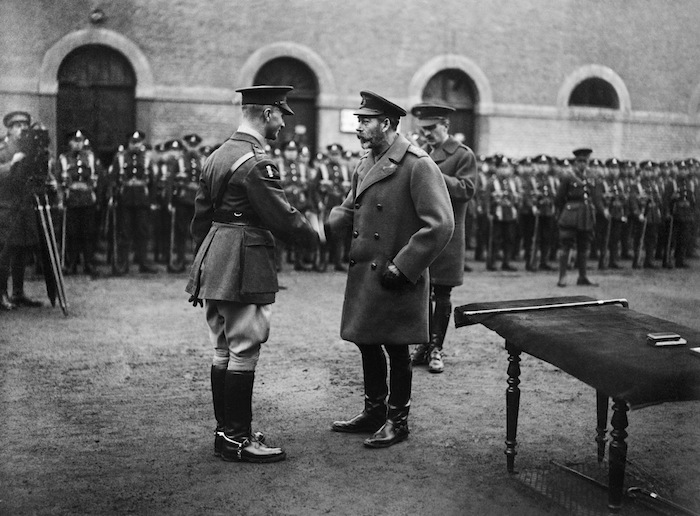 Daniel Beak receives his VC from King George V at Valenciennes © Imperial War Museum - Image No: Q 9759 | |
JACK FOREMAN MANTLE (1917-1940)Jack Mantle was born in Wandsworth, London on 12 April 1917. He attended Taunton's School between 1929 and 1931, joining the Royal Navy in 1934. He trained at HMS St Vincent at Portsmouth, and subsequently served aboard HMS Kent, and on HMS Aurora seeing service on the China Station and in the Mediterranean. 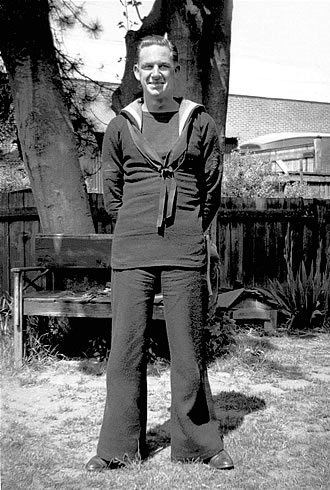 Jack Mantle (thought to have been photographed in his back garden) On 4 July 1940 HMS Foylebank was in Portland Harbour when German Stuka bombers attacked the harbour and the ships in it. Called to action stations LS Mantle was in charge of the starboard pom-pom gun. The citation for the subsequent award of the Victoria Cross is short, pithy and succinct. The school journal of December 20th 1940 when looking back on his time at school reflected on him as "a boy with quiet and unobtrusive qualities that foreshadowed the valiant nature of his passing". 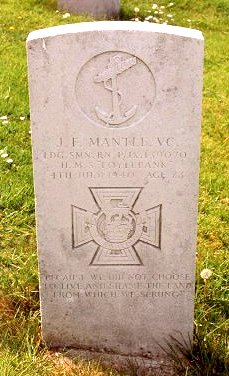 Jack Mantle's Grave in Portland Military Cemetary
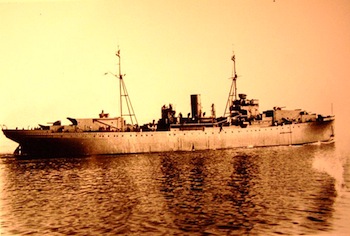 HMS Foylebank | |
Citation in the London Gazette, 3 September 1940The King has been graciously pleased to approve the grant of the Victoria Cross, for valour in action against the enemy to the late Acting Leading Seaman Jack Foreman Mantle P/JX.139070 H.M.S. Foylebank."Leading Seaman Jack Mantle was in charge of the starboard pom-pom when FOYLEBANK was attacked by enemy aircraft on the 4th of July, 1940. Early in the action his left leg was shattered by a bomb, but he stood fast at his gun and went on firing with hand-gear only; for the ship's electric power had failed. Almost at once he was wounded again in many places. Between his bursts of fire he had time to reflect on the grievous injuries of which he was soon to die; but his great courage bore him up till the end of the fight, when he fell by the gun he had so valiantly served."
|